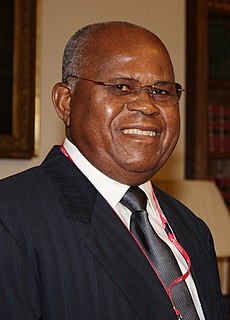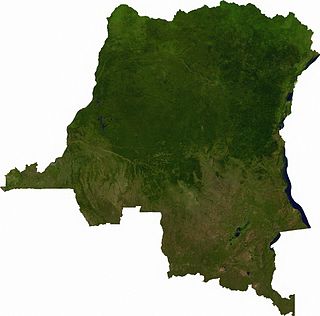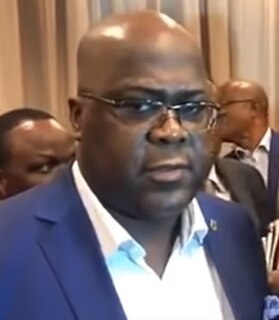The region that is now the Democratic Republic of the Congo was first settled about 80,000 years ago. The Kingdom of Congo remained present in the region between the 14th and the early 19th centuries. Belgian colonization began when King Leopold II founded the Congo Free State, a corporate state run solely by King Leopold. Reports of widespread murder and torture in the rubber plantations led the Belgian government to seize the Congo from Leopold II and establish the Belgian Congo. Under Belgian rule numerous Christian organizations attempted to Westernize the Congolese people.

Politics of the Democratic Republic of Congo take place in a framework of a republic in transition from a civil war to a semi-presidential republic.

Joseph Kabila Kabange is a Congolese politician who served as President of the Democratic Republic of the Congo between January 2001 and January 2019. He took office ten days after the assassination of his father, President Laurent-Désiré Kabila. He was elected as President in 2006 and re-elected in 2011 for a second term. Since stepping down after the 2018 election, Kabila, as a former president, will be a senator for life, according to the Constitution of the DRC.

Étienne Tshisekedi wa Mulumba was a Congolese politician and the leader of the Union for Democracy and Social Progress (UDPS), the main opposing political party in the Democratic Republic of the Congo (DRC). A long-time opposition leader, he served as Prime Minister of the country on three brief occasions: in 1991, 1992–1993, and 1997.

Kananga, formerly known as Luluabourg or Luluaburg, is the capital city of the Kasai-Central Province in the Democratic Republic of the Congo and was the capital of the former Kasaï-Occidental Province. The city has an estimated population of 1,463,556.

General elections were held in the Democratic Republic of the Congo on July 30, 2006, the first multiparty elections in the country in 41 years. Voters went to the polls to elect both a new President of the Republic and a new National Assembly, the lower-house of the Parliament.

Articles related to the Democratic Republic of the Congo include:

Elections to the Senate of the Democratic Republic of the Congo were held on 2007-01-19, though they had originally been scheduled for 2007-01-16. The members of the Senate were chosen through indirect election by the members of the provincial assemblies; the delay was a result of the difficulties in choosing traditional chiefs to fill the places reserved for them in the provincial assemblies.
Congolese history in the 2000s has primarily revolved around the Second Congo War (1998–2003) and the empowerment of a transitional government.
Simon Mbatshi Batshia is a politician from the Democratic Republic of the Congo. He was the Governor of Bas-Congo province from February 2007 to March 2012, when he was elected as a deputy to the National Assembly. Batshia is also a consultant in conflict resolution at the Centre for Conflict Resolution, based in Cape Town, South Africa, and is a member of the South African Institute for International Affairs.
Médard Mulangala Lwakabwanga is a politician from the Democratic Republic of the Congo. He is President of the Union for a Republican Majority and a leader of the Union Sacree pour l’Alternance, an umbrella grouping of opposition parliamentary parties and community groups that forms the third-largest political structure within the opposition and Rapporteur of the National Assembly’s Committee on Economics and Finance, making him the opposition’s lead spokesman on budgetary, economic and investment policy in the Republic.

United Nations Security Council Resolution 1711, adopted unanimously on September 29, 2006, after recalling all previous resolutions concerning the situation in the Democratic Republic of the Congo, including resolutions 1565 (2004), 1592 (2005), 1596 (2005), 1621 (2005), 1628 (2005), 1635 (2005), 1671 (2006) and 1693 (2006), and resolutions 1650 (2005), 1669 (2006), 1692 (2006) on the situation in Burundi and the African Great Lakes region, the Council extended the mandate of the United Nations Mission in the Democratic Republic of Congo (MONUC) until February 15, 2007.

Elections were held in the Democratic Republic of the Congo for 108 seats of the country's Senate on 14 March 2019. Former DRC President Joseph Kabila, who stepped down from office in January 2019 following the inauguration of the recently elected Félix Tshisekedi, has also joined the upper house of the legislature as a senator for life, for a total of 109 seats.
The Land Forces, also called the Congolese army, are the land warfare component and the largest branch of the Armed Forces of the Democratic Republic of the Congo (FARDC).

General elections were held in the Democratic Republic of the Congo on 30 December 2018, to determine a successor to President Joseph Kabila, as well as for the 500 seats of the National Assembly and 715 provincial council seats. It was announced on 10 January 2019 that Félix Tshisekedi (UDPS) won with 38.6% of the vote, defeating another opposition candidate, Martin Fayulu, and Emmanuel Ramazani Shadary, backed by the ruling party PPRD. Fayulu alleged that the vote was rigged against him in a deal made by Tshisekedi and outgoing President Kabila, challenging the result in the DRC's Constitutional Court. Different election observers, including those from the country's Roman Catholic Church, also cast doubt on the official result. Nonetheless on 20 January the Court rejected his appeal and declared Tshisekedi as the winner. Parties supporting President Kabila won the majority of seats in the National Assembly. Félix Tshisekedi was sworn in as the 5th President of the Democratic Republic of the Congo on 24 January 2019, making it the first peaceful transition of power in the country since it became independent from Belgium in 1960.
The following lists events in the year 2017 in the Democratic Republic of the Congo.

Gubernatorial elections took place in 20 out of the 21 provinces of the Democratic Republic of the Congo on 26 March 2016. The elections were the first to take place since the Congolese government has fragmented the former 11 provinces into 26 as mandated by the DRC constitution, though by the time elections occurred only 21 provinces had completed the reform process. In most of the provinces, the elected governors are members or affiliates of the Alliance of the Presidential Majority.

Gubernatorial elections took place in 11 out of the 26 provinces of the Democratic Republic of the Congo on 26 August 2017, with a second round held in three provinces on August 29. Elections in three other provinces were not held until 21 December 2017. The elections occurred after several governors had been dismissed. Applications of potential candidates were submitted to the Independent National Electoral Commission from 21 to 25 July, 2017, with a period for the review of the applications from 26 to 30 July. On August 2, the list of candidates was published and the following two days were granted for any appeals. More than half of the provinces were won by candidates of the Alliance of the Presidential Majority, though some went to independent opposition candidates.












